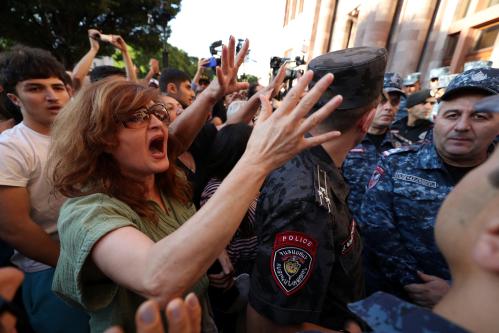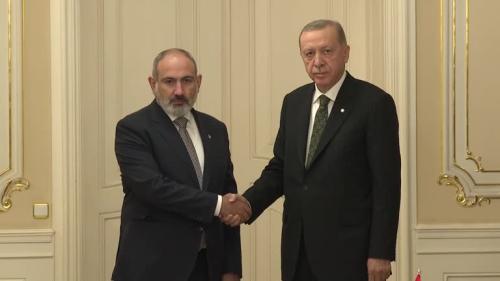

Upcoming Event
On December 4, 2006, Dr. Charles King, Associate Professor at Georgetown Univerisity’s School of Foreign Service and Department of Government, and Dr. Dmitri Trenin, Deputy Director and Senior Associate at the Carnegie Moscow Center, offered their insight on political developments throughout the Caucasus region.
Professor Charles King began by refuting the perception that the Caucasus does not exist as a “unified” region, arguing that the area is back on international agendas for the first time since the 1830s and 1840s, and consequently, researchers and policy makers are “rediscovering” this part of the world.
King identified five factors contributing to this rediscovery. First, the United States has stepped up efforts to promote democracy in the South Caucasus. The US sees post-Rose Revolution Georgia as an ally in the region and would like to promote greater democracy in Azerbaijan and Armenia. This new-found interest in the South Caucasus has implications for the US-Russian relationship, and the possibility of confrontation between these two powers over policy in the Caucasus has further increased awareness of the region.
The second factor is Chechnya and the increased attention that the two wars have brought to the region. In addition to the military conflict in the North Caucasus, the many terrorist attacks associated with it, such as the hostage crises at the Dubrovka Theater and the school in Beslan, have reinforced the need to promote peace and stability throughout the Caucasus region.
Third, King argued that there has been a recent increase in international attention to the largely frozen conflicts in Azerbaijan and Georgia, reflecting a desire among policymakers to begin the process of resolving these conflicts before they “unfreeze.”
King cited the European Union’s extension of the European Neighborhood Policy to Armenia, Azerbaijan and Georgia as the fourth factor contributing to increased awareness of the region. On November 14, 2006, the EU announced the adoption of Action Plans with all three states of the South Caucasus.
The final factor identified is the increased international visibility of the “statelets” in the Caucasus, namely South Ossetia, Abkhazia, and Nagorny Karabakh. Their attempts to secure patronage from foreign states, especially Russia, have exacerbated the clash of interests among the major powers in the region.
King discussed the three most important policy issues in the region. The current situation in Georgia has important international dimensions. President Saakashvili has successfully transformed territorial issues into the top priority for Georgian society and politics, thereby deflecting criticism of the general failure of the state’s anti-corruption and economic policies. Further, while this change in emphasis addresses the domestic concerns of Saakashvili’s government, it has wide international ramifications, especially vis-à-vis its relationship with Russia.
King argued that the conflicts in Abkhazia and South Ossetia are not merely internal, secessionist battles, but they also are the frontlines of a frozen conflict between Georgia and Russia – a result of Russia’s status as the unofficial patron of these “statelets”. This conflict has kept Georgia on international agendas, especially in Washington, and any escalation of the conflict could quickly lead to an international crisis between western governments and Russia.
The second policy issue is the resolution of the region’s frozen conflicts. King focused on the two in Georgia– South Ossetia and Abkhazia, highlighting the implications of the upcoming decision on Kosovo’s independence. He argued that the granting of independence to Kosovo will establish a precedent that allows sovereign states to be stripped of their territories against their will. So far, the international community has not made an attempt to dispute such a precedent and this policy could have direct implications for the secessionist conflicts in Georgia.
There are two possibilities for the future of Abkhazia and South Ossetia. Whereas before the “Kosovo precedent” the choice was between independence or integration with the internationally recognized state, the new choice would be between independence or becoming a component of the Russian Federation. King argued that reintegration with Georgia is no longer an option for these “statelets”. Their civil societies have developed in such a way that they already are independent of Georgia, albeit with the support of the Russian Federation, and as a consequence, reintegration is not a viable option.
The third and final policy focus for the region is one relevant to much of the former Soviet Union: the need for increased development. The Caucasus suffers from structural poverty. Basic transportation services are either nonexistent or in poor condition, and communication systems are also in a state of extreme disrepair. Among the general population, “poverty is the order of the day.” The economies of the South Caucasus states are “economies of subsistence supported by remittances.” Further complicating the economic problems of these states are the significant shifts in their demographics. The rural areas of these states have become increasingly depopulated since independence, resulting in “not three countries but three city-states.” Rampant corruption of state officials has contributed to a lack of investment in local economies, which in turn produces great disparities between a wealthy minority and an impoverished majority.
King concluded his presentation with a brief discussion of the emerging national identities in the South Caucasus. All three states are attempting to reinterpret their historical narratives to create a revisionist history that portrays each state as ethnically homogenous in its development and modern identity. The irony, as he points out, is that all three of these states developed through relations with each other and ethnic homogeneity for each state is a very recent concept in the South Caucasus. In all, the future of the region looks troubled for many years to come.
Dr. Dmitri Trenin examined the Caucasus as a region crucial to Russia’s security interests. In contrast to King, Trenin views the North and South Caucasus as two separate and distinct regions. The North Caucasus is a region nominally part of the Russian Federation that has become what Trenin calls the “inner abroad.” The South Caucasus states are drifting away from Moscow’s orbit, and the Kremlin is going to have to treat the three post-Soviet states as independent entities rather than as the “near abroad.”
The North Caucasus has been stabilizing slowly, but the region continues to represent a “clear and present danger” to Russia’s security. . Trenin argued that while violence in Chechnya has diminished, its stability is deceptive. Rather than employing a policy of uniting powerful factions, the Kremlin has granted enormous power to Ramzan Kadyrov making the prime minister like a Khan. This policy of Kadyrovization is deceptive as this dominance could be challenged easily by terrorism or another force. This situation could be exploited by figures interested in preventing President Vladimir Putin from leaving power. If Putin’s chosen successor is unacceptable to powerful parties, they may instigate violence in the North Caucasus to disrupt the succession. Trenin believes that the murder of journalist Anna Politkovskaya may be an early murmur of such an endeavor.
Russia has a disjointed policy towards the South Caucasus states, and its policy is failing in each one of them. Trenin stressed the role of the competition between the United States, Europe and Russia over influence in the three states. Russia’s recent actions in Georgia consisted of blunders that only strengthened the position of President Mikhail Saakashvili’s pro-western, anti-Russian regime. As a result, he believes that Russia is in the process of losing Georgia, and Russia will be faced with unpalatable choices regarding Georgia’s future in the CIS and NATO. President Putin is under increasing pressure to reintegrate the breakaway regions of Abkhazia and South Ossetia into the Russian Federation, and he is wisely resisting. Abkhazia has never been integrated meaningfully into Georgia, and it is extremely unlikely that it ever will be. The Kremlin is taking a pragmatic approach waiting to see how the Kosovo question unfolds.
Azerbaijan and Armenia have been similarly marginalized by Russian policy. Trenin described Russian policy towards Azerbaijan as one of “real economics.” This year Russian-dominated Gazprom cut off natural gas exports to Azerbaijan after a dispute over prices. As a result, relations between the two states have soured. Russia’s historically strategic relationship with Armenia is not backed by economic pragmatism. Armenians hoped that the acquisition of national industries by Russian companies would result in economic growth, but the high rate of unemployment in Armenia has not changed. Russia’s failed policies in the South Caucasus demonstrate its status as a post-imperial power. While Russia remains a powerful regional player, it no longer retains a position of an imperial authority that can exert its will on the states of the South Caucasus.
. . .
Charles King is Chair of the Faculty and Associate Professor in the School of Foreign Service at Georgetown University. He is the author of The Black Sea: A History (2004) and The Moldovans: Romania, Russia, and the Politics of Culture (2000). King’s research interests include political change, social violence, and ethnicity in Eastern Europe and the former Soviet Union. He received his D.Phil. in Politics from Oxford University.
Dmitri Trenin is Deputy Director and Senior Associate at the Carnegie Moscow Center directing the Center’s research program on political, economic, social, and foreign policy challenges of Russia and the former Soviet Union. He is the author of Integration and Identity: Russia as a New West (2006) and Die gestrandete Weltmacht (2005). He received his Ph.D. in History and M.A. in International Relations from the Moscow Institute of the USA and Canada.
Related Links:
Caucasus: Georgia, Azerbaijan Seek Alternatives to Russian Gas by Liz Fuller
The Politics of a Name: Between Consolidation and Separation in the Northern Caucasus by Victor Shnirelman
Any views presented in this summary reflect the views of the identified individuals and not of The Brookings Institution or Georgetown University. This newsletter is prepared by Robert Dura and Jonathan Hayes, Georgetown University.

Aslı Aydıntaşbaş
September 20, 2023
2023
The Brookings Institution, Washington DC
2:30 pm - 3:45 pm EDT

Aslı Aydıntaşbaş
October 7, 2022